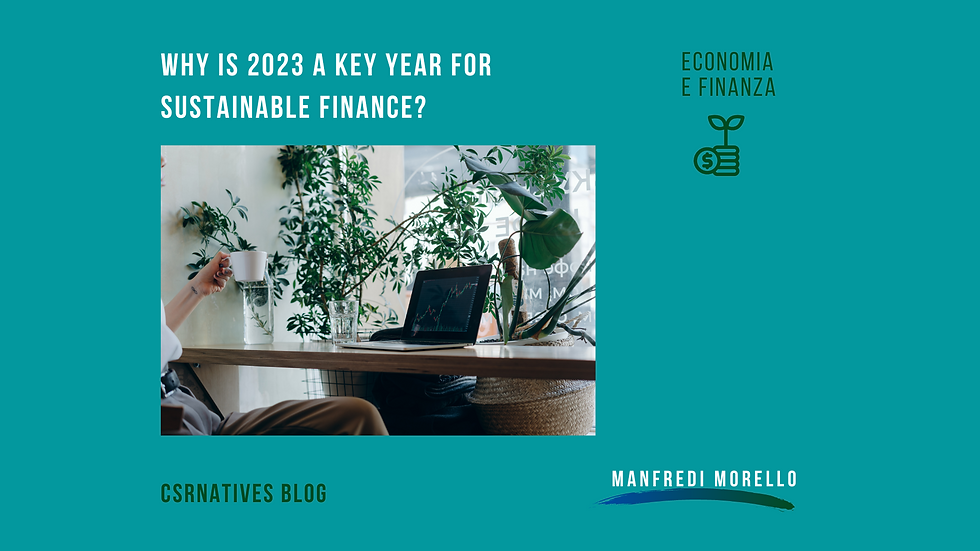ESG Rating Agencies are here to stay: we tell you why
- CSRnative
- 24 ott 2023
- Tempo di lettura: 3 min
Our initial story dates back in 2021. Our hypothesis was that Credit Rating Agencies (CRAs) could nothing but promote ESG assessments inside their methodologies as an ancillary and relevant element without substituting their core analysis. The possibility of a single agency giving two opposite market-mover opinions on a single entity, security or country was just to show the empirical unlikeliness of such hypotheses. Further evidence came around when influent representatives from more than one market operators publicly stated that CRAs would ever take over ESG ratings. [1]

Academia has been arguing that sliding doors options for CRAs to enter the ESG rating market were still in place. The blurred area left by the lack of regulatory mechanisms on ESG ratings could not have entirely precluded the possibility for CRAs to start off another oligopolistic activity. The underlying market matters such as the lack of transparency, accountability, independence and correlation among ESG Ratings Providers’ methodologies had become more than a just a simple fact – as a distinguished academic has noticeably observed. [2] But many ‘pure’ ESG Ratings Agencies (RAs) had already been establishing their activities – and an intervention would have been more than necessary.
In 2022, initial regulatory frameworks have loomed at the global level [3] and so our story develops, since ESG Ratings have been a recurrent element of Sustainable Finance, especially within the European Market. So the ESG Rating Regulation story continues with new set of voluntary rules as well as incoming mandatory ones, especially across the UK [4] and Europe [5]. Given to many reasons, among whom the different nature of its legislative system, the EU has undertaken hard regulation. The Impact Assessment of the EU Commission accompanying the proposal of a regulation for ESG Rating Agencies (i.e., ESG RAs) has identified the main public methodologies (i.e., MSCI, EcoVadis, CDP and Standard Ethics) while also affirming a clear-cut distinction ESG RAs between business models. [6] The Proposal of a European Regulation on the matter then contained pre-emptive provisions to avoid a oligopoly in the ESG ratings market, also with the idea to create an authorisation regime for ESG RAs, supervised by the European Securities and Market Authority.
So we get to the crucial point of this story. The legislative procedure is continuing: in a significant move to foster a more competitive and transparent ESG ratings market, this month of 2023 the European Parliament's Committee on Economic and Monetary Affairs (ECON) has proposed new rules that could bring about a positive transformation. [7] Transparency and accountability are at the forefront of these amendments, with ESG RAs compelled to disclose their methodologies and take responsibility for their opinions on companies ESG grades. But the novelty is the requirement for users of ESG ratings who employ more than one evaluation tool to also utilise smaller agencies, to increase competition and open doors for more agencies to enter the market. The new rules level the playing field for both small and large ESG rating agencies, facilitating an easier entry for newcomers to challenge the status quo. This shift promises a more innovative market, with smaller agencies focused on providing top-notch services and methodologies for all the involved stakeholders. This not only benefits users but also the ESG rating agencies themselves. Could smaller agencies bring fresh perspectives and dedication towards a more competitive, open and sustainable ESG ratings market? Our story is still unfinished. But it will continue, waiting for new, crucial distinctive traits to be in place in the next few months.
Sources
[1] Morello M. (2021) “Will Credit Rating Agencies take over ESG Rating Agencies?”. CSRNatives Blog. URL: https://www.csrnatives.net/post/will-credit-rating-agencies-take-over-esg-rating-agencies
[2] Dr Daniel Cash “Can Regulatory Intervention Save the Sustainability Rating Industry?”. pre-publication version of an accepted paper, to be published within the Business Law Review. URL: https://publications.aston.ac.uk/id/eprint/42139/1/SSRN_id3688905.pdf
[3] HK Green Finance Blog (2021) “IOSCO consults on ESG Ratings and Data Providers”. URL: https://www.hkgreenfinance.org/iosco-consults-on-esg-ratings-and-data-providers/?lang=zh-hans
[4] Ashurst (2023) “ESG data and ratings providers the regulatory net has been cast”. URL: https://www.ashurst.com/en/insights/esg-data-and-ratings-providers-the-regulatory-net-has-been-cast/
[5] Morello M. (2023) “2023: Revolutionizing Sustainable Finance - Unveiling Groundbreaking Regulations for ESG Ratings”. URL: https://www.csrnatives.net/post/2023-revolutionizing-sustainable-finance-unveiling-groundbreaking-regulations-for-esg-ratings
[6] European Commission (2023) “Executive Summary of the Impact Assessment Accompanying the document Proposal for a Regulation of the European Parliament and of the Council on the transparency and integrity of Environmental, Social and Governance (ESG) rating activities”. URL: https://ec.europa.eu/finance/docs/law/230613-summary-impact-assessment_en.pdf
[7] European Parliament Committee on Economic and Monetary Affairs (2023) Draft Report on the proposal for a regulation of the European Parliament and of the Council on the transparency and integrity of Environmental, Social and Governance (ESG) rating activities. URL: https://www.eticanews.it/wp-content/uploads/2023/10/ECON-PR-753758_EN.pdf


Commenti